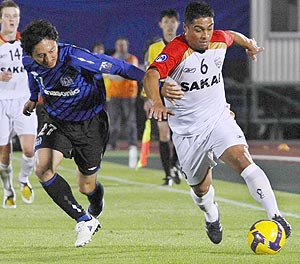Paul Izzo comes up with THREE shootout saves as Melbourne Victory cap off miraculous comeback
After being a goal down and having a player sent off, Victory fought back to level in regulation time and win a shootout, thanks…

Brazilian defender Cassio of Australia's Adelaide United, right, is charged by Hideo Hashimoto of Japan's Gamba Osaka in the first leg of the Asian Champions League final in Osaka, western Japan, Wednesday, Nov. 5, 2008. Gamba Osaka defeated Adelaide United 3-0. AP Photo/Kyodo News
Reports from FourFourTwo last week that Brazilian veterans Denilson and Roque Junior are interested in the A-League will be music to the ears of Australian officials. For one thing, the pair are famous names.
More importantly though, it was a piece of good news in a week in which many questioned the quality of the league itself.
After Kawasaki Frontale’s recent 5-0 Champions League thrashing of the Central Coast Mariners, there’s increasing awareness in Australia of just how effective the Japanese pipeline into Brazilian football is.
Kawasaki’s fleet-footed Brazilian trio conjured envy and admiration in equal measure, and while Australians might assume that the legendary Zico was the first Brazilian to arrive, the truth is that Japan has a long association with Brazil.
Economic ties between the two countries stretch back more than a century, and players like Wagner Lopes moved to Japan even before the J. League kicked off, while Kazu Miura started his career at Brazilian giants Santos.
Just this week reports in the Italian press linked Japan’s Brazilian-born defender Marcus Tulio Tanaka with a move to Milan – a club he played against at the 2007 FIFA Club World Cup.
But when I asked respected Brazilian journalist André Fontenelle what Brazilians thought of Tulio, his response was telling.
“People talked about Tulio a bit when Urawa played in the World Club Championship. But he never quite made headlines. The novelty effect has gone since Kazu, Wagner Lopes and Alex.”
That was a response I was well prepared for.
Earlier I had emailed Tim Vickery – a respected authority on South American football and a regular fixture on Australian TV.
When I pointed out that five of the top ten goalscorers in last season’s Brazilian top flight had played in the J. League, Vickery’s assessment of that feat was blunt.
Responding to the question of how Brazilians regard Japanese football, Vickery wrote “it’s a place to go to make money – downside is that while you’re there you might as well not exist as far as the domestic public are concerned, and nothing you do there will be taken very seriously.”
That’s a sentiment echoed by Fontenelle, who says “in Zico’s days at Kashima there was some interest in the J. League, but that has faded long ago. When a player or coach goes to Japan he virtually disappears from public view until he comes back.
The casual disregard back home hasn’t discouraged Brazilians from excelling in Japan.
Especially in vogue are Brazilian strikers – with their selfishness in front of goal a blessing in such a group-oriented society.
You have to go back to the first stage of the 2003 season to find a non-Brazilian top-scorer, and ironically that was South Korean goal machine Choi Yong-Soo.
And with the Japanese government currently making headlines for their dubious attempts to repatriate unemployed foreign-born workers, Brazilians nevertheless remain an integral feature of the Japanese football landscape.
Portrayals of Brazilian players in Asia as mere mercenaries is a disservice to those who sacrifice a comfortable life at home in order to make a living overseas.
Many choose to stay on in their adopted countries – as current Kashiwa Reysol midfielder Alex is reportedly considering – while some like Shimizu S-Pulse workhorse Marcos Paulo Alves become cult heroes for their strong work ethic and jovial disposition.
And they do so in a foreign land, far away from family and friends and struggling to deal on a day-to-day basis with an alien language.
They may be handsomely rewarded, and many find fame and fortune in Asian football when they may have toiled in anonymity back home.
But Brazilians make plenty of sacrifices to play in Asia – a region known for its fluctuating climes and strict work environments.
Perhaps that’s something that Australia can take advantage of.
If sun, sand and a laid-back atmosphere is what it takes to lure a couple of Brazilian veterans like Denilson and Roque Junior to the A-League, then maybe Australian clubs can finally justify offering a “nice lifestyle” in their quest to add new talent.